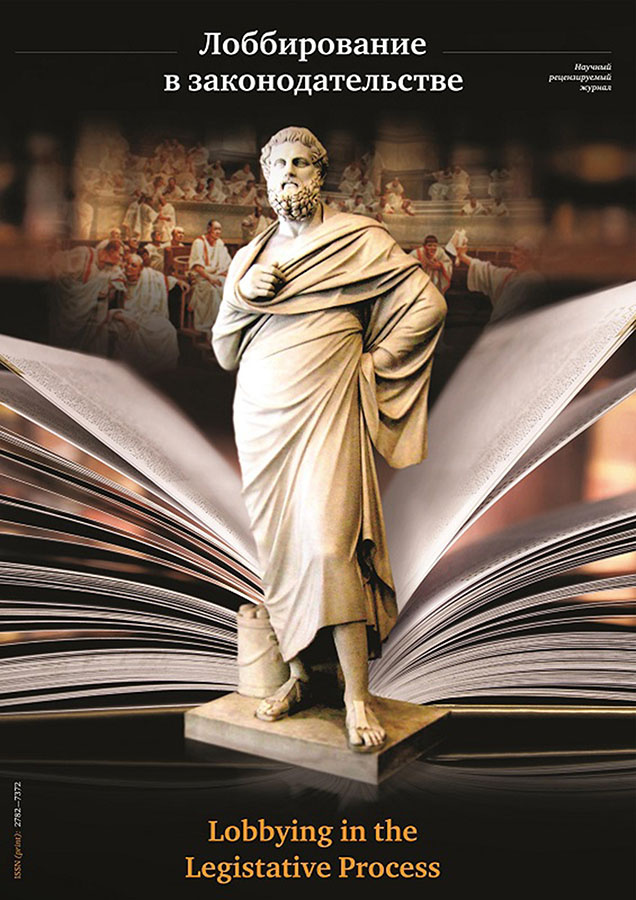Lobbying and legal transformations: constitutional guidelines in the context of global change
- Authors: Nurmagambetov R.G.1, Ukin S.K.2
-
Affiliations:
- Kostanay branch of Chelyabinsk State University
- Kostanay Regional University named after A. Baitursynov
- Issue: Vol 4, No 3 (2025)
- Pages: 117-123
- Section: Issues of Lobbying in the Legislative Process of Republic of Kazakhstan
- URL: https://journals.eco-vector.com/2782-7372/article/view/695426
- DOI: https://doi.org/10.33693/2782-7372-2025-4-3-117-123
- EDN: https://elibrary.ru/AMWLBW
- ID: 695426
Cite item
Abstract
In the context of rapid global transformations driven by the digitalization of the economy, politics, and the social sphere, rethinking approaches to constitutional and legal regulation becomes especially relevant. This article examines the challenges faced by modern constitutions due to the spread of digital technologies and analyzes emerging legal gaps in the regulation of new social relations. The author explores the theoretical foundations of the need to adapt constitutional norms to the conditions of digital reality, including virtual spaces, artificial intelligence technologies, distributed ledgers, and other elements of the digital environment. Special attention is given to the correlation between digital innovation and the foundations of constitutional order, the principles of the rule of law, and the protection of human rights under new conditions. In this context, the role of lobbying is analyzed as a mechanism for the legitimate representation of the interests of digital actors – technology corporations, civil society, and the expert community – in the process of legal transformation. Based on an analysis of legal literature and constitutional texts from various countries, the article concludes that targeted amendments to provisions concerning fundamental rights and freedoms, constitutional order, and the organization of public authority are inevitable. The article proposes a range of practical solutions, including the development of conceptual approaches to the legal recognition of digital rights, mechanisms for their implementation, and the institutionalization of lobbying activities as a tool for shaping a sustainable digital legal agenda. Thus, in modern conditions, lobbying acquires new significance as an element of constitutional architecture, reflecting the need for dialogue between the state and digital society—an element that requires constructive analysis and doctrinal study.
Full Text
About the authors
Rashit G. Nurmagambetov
Kostanay branch of Chelyabinsk State University
Author for correspondence.
Email: Orel032@mail.ru
ORCID iD: 0000-0003-0434-7565
Dr. Sci. (Philos.) in Law, Associate Professor; Professor, Department of Law
Kazakhstan, KostanaySymbat K. Ukin
Kostanay Regional University named after A. Baitursynov
Email: justitia8@mail.ru
Cand. Sci. (Law), Associate Professor; associate professor, Department of Theory of State and Law
Kazakhstan, KostanayReferences
- Arutyunyan A.S. The potential of digital services as a space for lobbying social interests. In: Social communication in contemporary Russian society. Proceedings of the All-Russian Scientific and Practical Conference (Moscow, October 20, 2022). V.A. Mansurov, T.Z. Adamyants (gen. eds.). E.Yu. Ivanova, P.S. Yuryev (eds.). Moscow: ROS; FNISCS RAS, 2023. Pp. 206–213.
- Altukhov A.V., Kashkin S.Yu. The legal nature of digital platforms in Russian and foreign doctrine. Actual Problems of Russian Law. 2021. Vol. 16. No. 7. Pp. 86–94. (In Rus.)
- Nurmagambetov R.G., Ukin S.K., Nalizko N.A. New legal objects created by digital technologies and the legal consequences of related legal relations. Scientific and Legal Journal “Bulletin of the Institute of Legislation and Legal Information of the Republic of Kazakhstan”. 2023. No. 4 (75). Pp. 53–60. (In Rus.)
- Khertek A.A., Bildinmaa B.P. On digital rights. Bulletin of the Magistracy. 2022. No. 2-2 (125). Pp. 64–65. (In Rus.)
- Shakhray S.M. The digital constitution: Fundamental rights and freedoms in a total information society. Herald of the Russian Academy of Sciences. 2018. Vol. 88. No. 12. Pp. 1075–1082. (In Rus.)
Supplementary files









